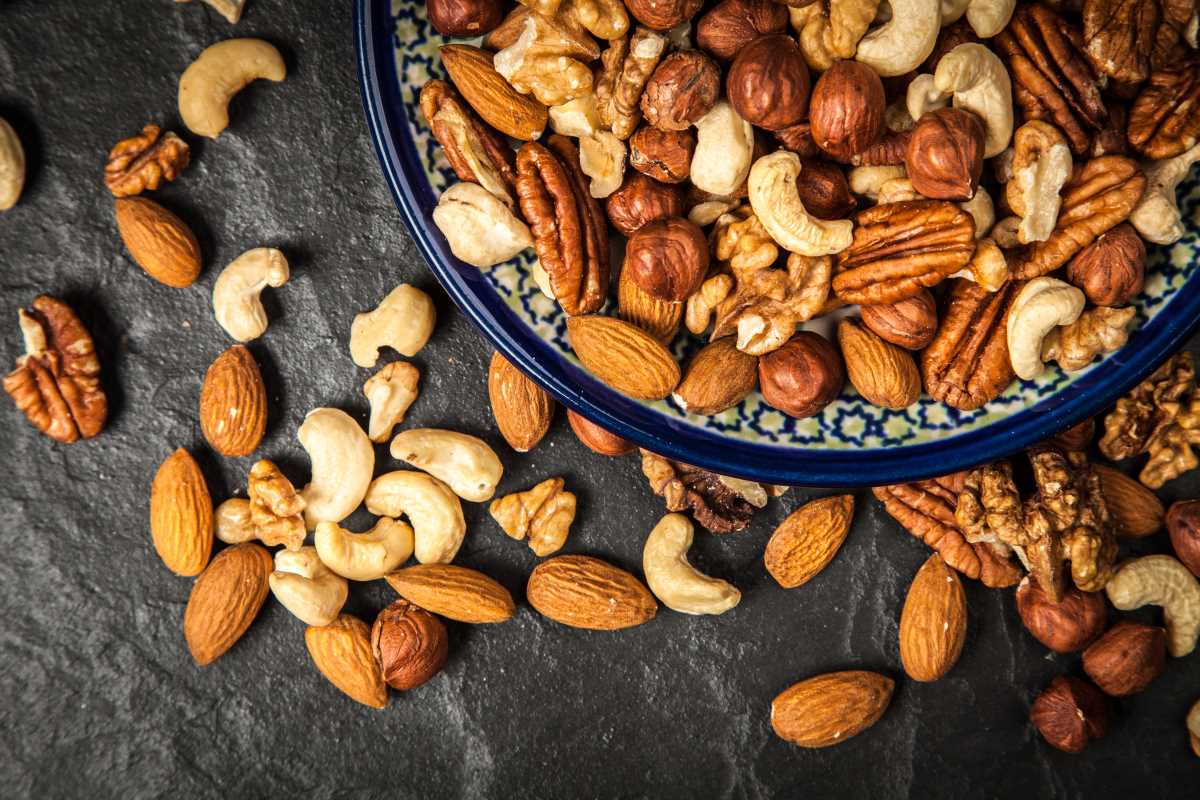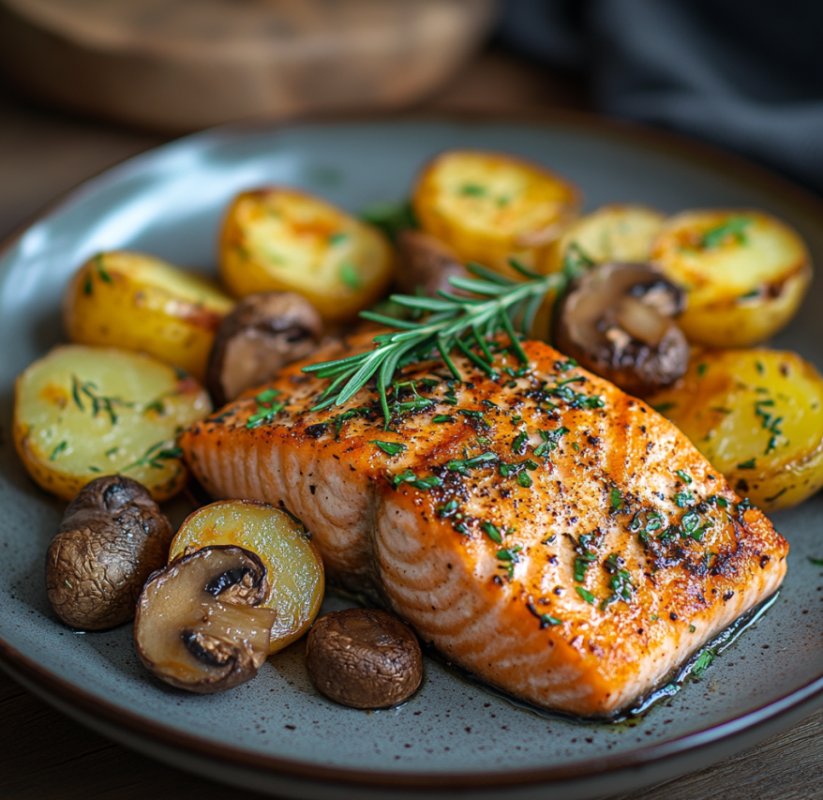Nuts are often relegated to the snack bowl or sprinkled sparingly on a salad. While they are a well-known healthy snack, their true potential is unlocked when they become a regular feature in your meals. Far more than a crunchy topping, including a small serving of nuts at breakfast, lunch, and dinner can deliver a surprising array of health benefits that go well beyond basic nutrition. From stabilizing your blood sugar to supporting brain health, you will discover why these nutritional powerhouses deserve a promotion from occasional snack to everyday ingredient.
More Than a Snack: A Nutritional Powerhouse
Nuts pack an incredible amount of nutrition into a small package. Their unique combination of macronutrients and micronutrients is what makes them so effective at improving health.
- Healthy Fats: Nuts are rich in monounsaturated and polyunsaturated fats, which are crucial for heart health, reducing inflammation, and supporting brain function.
- Plant-Based Protein: Providing a solid source of protein, nuts help build and repair tissues, support muscle mass, and contribute to a feeling of fullness.
- Dietary Fiber: Nuts are an excellent source of fiber, which is essential for digestive health, blood sugar regulation, and maintaining a healthy weight.
- Vitamins and Minerals: Each type of nut offers a unique profile of micronutrients, including vitamin E, magnesium, selenium, and B vitamins, all of which play vital roles in energy production and disease prevention.
Unexpected Benefits Beyond Heart Health
While the heart-healthy fats in nuts get most of the attention, the health benefits of nuts extend much further.
Superior Blood Sugar Stability
Adding nuts to a meal can significantly blunt the blood sugar spike that often follows, especially from carbohydrate-rich foods. The combination of fiber, healthy fats, and protein slows down the absorption of glucose into the bloodstream. This leads to more stable energy levels, reduced cravings, and a lower risk of developing insulin resistance over time. Consistent nuts for blood sugar control can be a simple yet powerful dietary strategy.
Enhanced Satiety and Weight Management
The fat, fiber, and protein trio in nuts makes them incredibly satiating. Including them in your meals helps you feel fuller for longer, which can naturally lead to eating fewer calories throughout the day. Studies suggest that despite being calorie-dense, regular nut consumption is not associated with weight gain and may even support weight loss efforts as part of a balanced diet.
A Boost for Gut Health
The fiber in nuts acts as a prebiotic, feeding the beneficial bacteria in your gut. A healthy gut microbiome is linked to improved immunity, better mood, and lower inflammation. Almonds, pistachios, and pecans are part of a high-fiber nuts list that can contribute to a thriving internal ecosystem.
Cognitive and Mood Support
The omega-3 fatty acids (especially in walnuts), antioxidants like vitamin E, and magnesium found in nuts play a direct role in brain health. These nutrients help protect brain cells from oxidative stress, reduce inflammation, and support neurotransmitter function, potentially improving memory, focus, and even mood.
Common Concerns and How to Address Them
While nuts are incredibly healthy, some common questions and concerns are worth addressing.
- Portion Control: A serving size is about one ounce (28 grams), which looks like a small handful. It's easy to overeat nuts, so portioning them out is key.
- Allergies: Nut allergies are serious and can be life-threatening. Those with a diagnosed allergy must avoid nuts entirely.
- Antinutrients (Phytates and Oxalates): Nuts contain compounds that can slightly reduce the absorption of certain minerals. For most people, this is not a concern in the context of a varied diet. Soaking or sprouting nuts can reduce these compounds.
- Added Ingredients: Choose raw or dry-roasted, unsalted nuts whenever possible. Many packaged nuts are roasted in industrial oils and loaded with sodium, sugar, or other flavorings that negate their health benefits.
Simple Ways to Add Nuts to Every Meal
Incorporating nuts is easy and versatile. Aim for a one-ounce serving with each meal.
Breakfast
- Stir a tablespoon of almond butter into oatmeal or yogurt.
- Sprinkle chopped walnuts or pecans over whole-grain toast with avocado.
- Add a handful of cashews to your morning smoothie for creaminess and protein.
Lunch
- Top a green salad with slivered almonds or crushed pistachios for crunch.
- Make a quick trail mix with various nuts and seeds to have alongside a sandwich.
- Blend soaked cashews into a creamy, dairy-free soup base or pasta sauce.
Dinner
- Add chopped hazelnuts to roasted vegetables like green beans or broccoli.
- Use ground pecans or walnuts as a "breading" for baked fish or chicken.
- Toast pine nuts and sprinkle them over pasta dishes or grain bowls.
These ideas work for nearly any dietary pattern, including vegan, gluten-free, and low-carb lifestyles.
How to Shop, Store, and Prep Nuts
To get the most out of your nuts, it helps to know how to buy and care for them.
- Shopping: Look for raw or dry-roasted nuts in the bulk section to save money. For nut butters, choose brands with only one or two ingredients: the nuts and perhaps a little salt.
- Storing: Nuts' high-fat content means they can go rancid. To learn how to store nuts long term, keep them in an airtight container in a cool, dark place. For maximum freshness, store them in the refrigerator (up to six months) or freezer (up to a year).
- Prepping: Toasting nuts in a dry pan for a few minutes enhances their flavor. Soaking raw nuts in water overnight can make them easier to digest and blend into creamy sauces or milks.
By weaving nuts into every meal, you are not simply adding flavor and texture; you are making a consistent investment in your metabolic health, cognitive function, and long-term well-being.
 (Image via
(Image via





